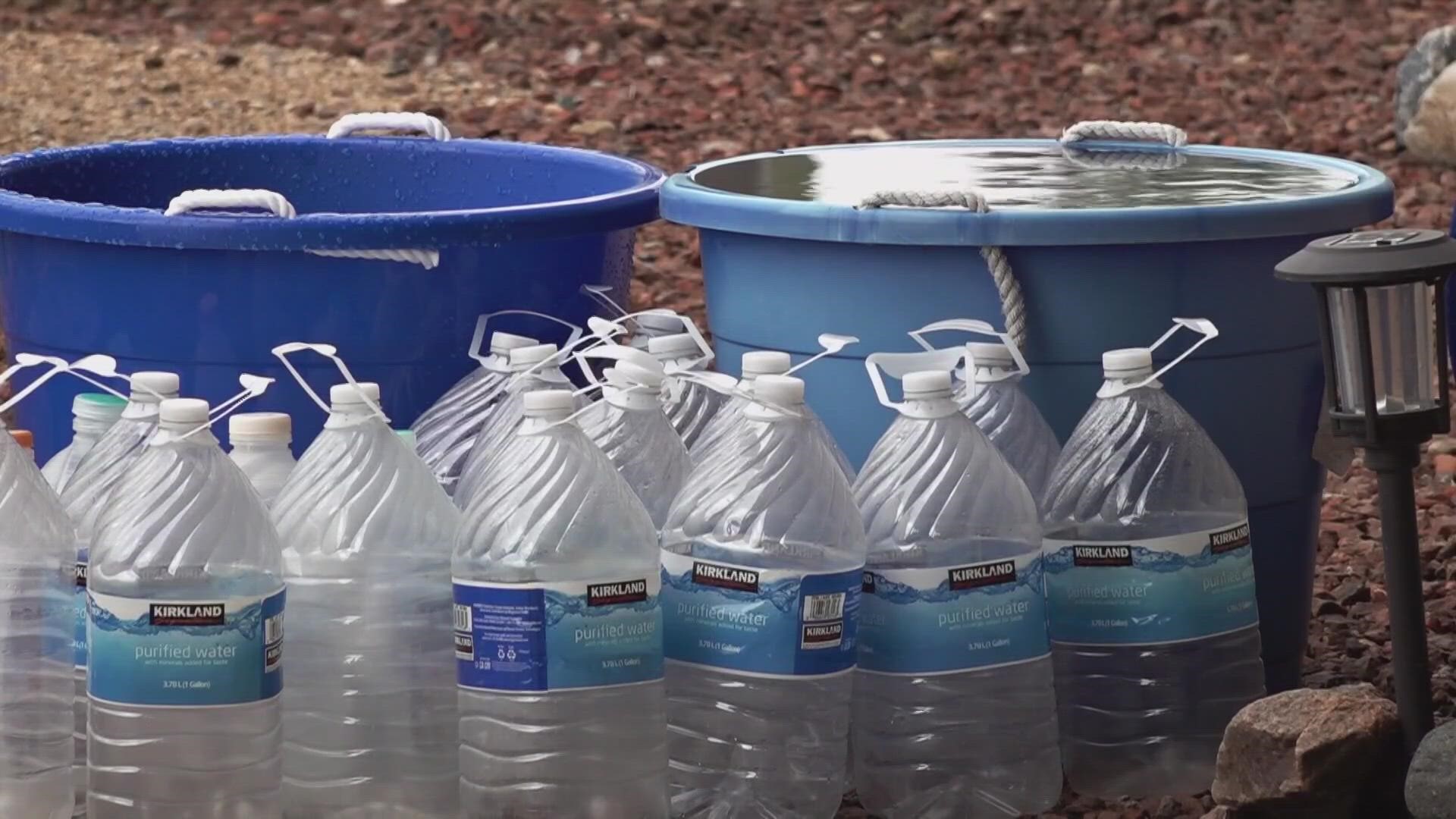PHOENIX — Where's the water coming from?
That's one of several unanswered questions about the City of Scottsdale's proposed agreement to restore water service to its unincorporated neighbor to the north, the Rio Verde Foothills.
The answers could be forthcoming at the Scottsdale City Council meeting at 5 p.m. Tuesday, where a vote of the proposed agreement is expected.
What would the proposal do?
- The city would buy and treat water that it would sell to Maricopa County.
- The county would deliver the water to Rio Verde Foothills residents.
- The county would also have to work on banning development in the foothills.
The council's approval of the proposal would trigger negotiations with Maricopa County on a final agreement.
Scottsdale's Jan. 1 shutoff of a standpipe delivering water to the desert subdivision has become a national symbol of Arizona's failure to manage the megadrought.
Rio Verde Foothills has no water infrastructure; homeowners use wells or relied on the nearby Scottsdale standpipe.
The proposed solution to the shutoff represents a rare coming together of governments at four levels - city, county, state and legislative - to deal with a potential public health crisis.
Ortega's proposed water sources both say 'no'
First-term Mayor David Ortega has offered two responses to "Where's the water coming from?" to supply Rio Verde Foothills. Neither answer has stood up to scrutiny.
On this weekend's "Sunday Square Off," Ortega said the city would purchase water from the Gila River Indian Community, which has an existing water contract with Scottsdale.
In response to a question from 12News, the Gila River tribe said it would not provide any water to Scottsdale.
When asked to explain his statement, Ortega told 12News via text message that he misspoke. He meant to say the Colorado River Indian Tribes (CRIT) was the provider.
But the leader of the Colorado River Tribes, like the Gila River Indian Community, says she can't supply water to Scottsdale.
"No one from Scottsdale has approached the tribes nor do they have the systems yet in place to deliver such water, even if there was agreement on what the price would be," said Jason Rose, a spokesman for Colorado River Tribes Chairwoman Amelia Flores.
In a text message Monday, Ortega said: "Several options through CRIT. No action until agreement processed."
Ortega: 'I misspoke'
On Tuesday, the City of Scottsdale emailed this statement from Ortega:
"I misspoke during (the) interview. The terms of the city's proposed agreement with Maricopa County are provided in the item going before City Council Tuesday night. However, the source of the water has not yet been determined."
One Foothills resident said Ortega shouldn't be making the decision on where to by the water.
"The messages that we get from Mayor Ortega are very confusing to this neighborhood," said Meredith DeAngelis, whose family has lived in the Rio Verde Foothills for 11 years.
"First, we hear the hard 'no,'... 'I'm not going to allow you to continue to get water from us,'" she said of Ortega.
"Now we hear, 'OK, if I can negotiate the water and provide the water, I will allow you to get water from us. But I'm going to determine the source.' And then the sources that he says he's getting water from are saying, 'No.'"
Rio Verde Foothills' residents are suspicious
"You're almost like, 'I'll take anything,' but there are some serious concerns that I see," DeAngelis said.
The last few weeks, she said, have been "really stressful."
"Just trying to make sure that you make every drop count."
Her family has relied on water hauled in from Apache Junction, about 50 miles away, at about triple the price of what they once paid.
Rio Verde Foothills residents' concerns about the proposal range from the lack of long-term support for development to suspicion about Ortega's motives.
"Are we making sure that this water is in fact affordable, and who's determining what that cost of water is, and also the source of water?" DeAngelis said.
The proposed agreement also calls for Scottsdale selling to Maricopa County 1 1/2 times the water that Rio Verde Foothills needs.
"It's like profiting off of people that are in trouble," said Christy Jackman, owner of a boarding ranch.
She wondered what Scottsdale would do with the surplus water and cash from the sale.
Jackman relies on well water, but she's looking out for neighbors.
"I've got people that are so excited that we're going to get moisture this week, because they're almost out of the water they flush the toilets with," she said.
Both DeAngelis and Jackman questioned why new Scottsdale subdivisions were bumping up against Rio Verde Foothills on the south, given the mayor's concerns about the megadrought's impact on the city's water supply when the city shut off Rio Verde Foothills.
"Why are we continuing to add new neighborhoods and not taking care of the existing people who are here?" DeAngelis said.
Another solution in EPCOR stopped because of bias?
Back in the fall, three months before Scottsdale cut off water deliveries to the Rio Verde Foothills on Jan. 1, the executive director of the city's water utility shared with council members a "treat and transport" plan submitted by EPCOR.
The short-term solution from EPCOR, a private water company, bears similarities to the plan the City Council will vote on Tuesday, except EPCOR had a ready supply of water.
But the plan was never put to a City Council vote. Ortega opposed it.
He ripped the councilwoman supporting the plan as "the insider pulling for EPCOR to exploit Scottsdale water facilities."
EPCOR is already working on a long-term solution that would provide water service to Rio Verde Foothills within about three years. That plan must be approved by the Arizona Corporation Commission.
Water Wars
Water levels are dwindling across the Southwest as the megadrought continues. Here's how Arizona and local communities are being affected.

